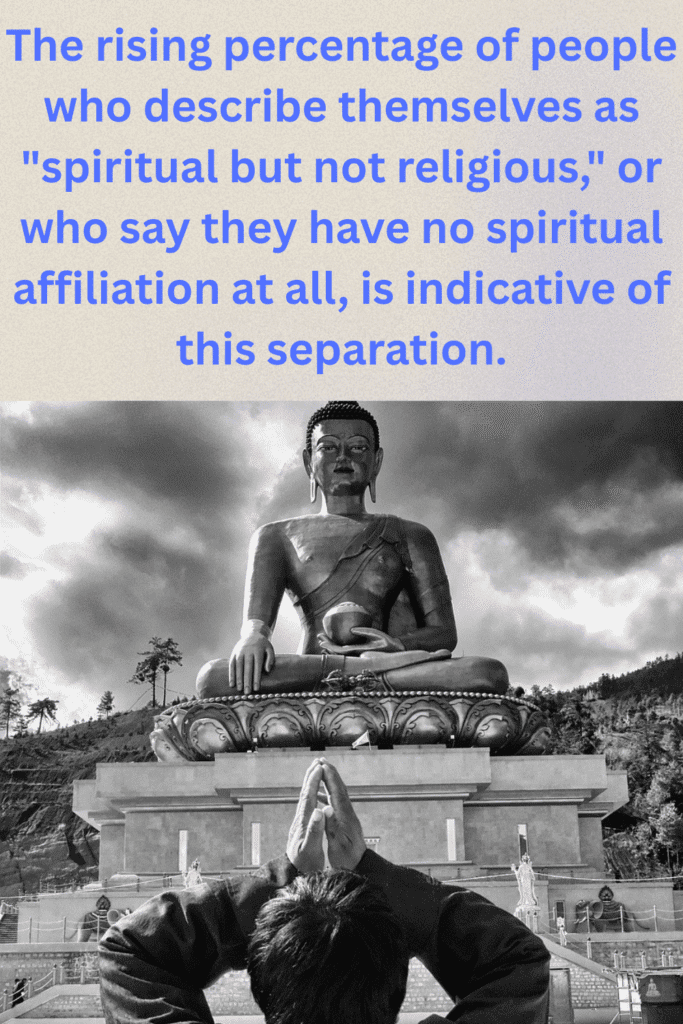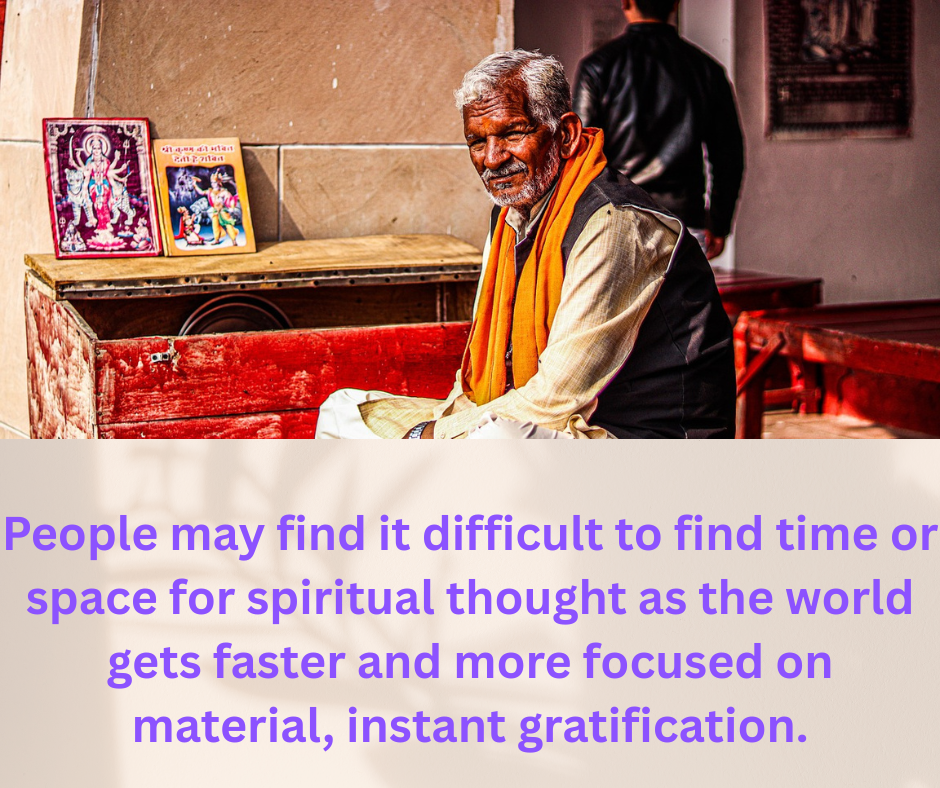People Disconnected from Spirituality For millennia, spirituality has been a vital aspect of human life, providing people with a feeling of meaning, purpose, and connection. It offers solutions to comprehend the enigmas of the cosmos, life, and our role in it. Nonetheless, many individuals say they feel cut off from spirituality in the fast-paced, technologically advanced world of today. The rising percentage of people who describe themselves as “spiritual but not religious,” or who say they have no spiritual affiliation at all, is indicative of this separation.

Even though spirituality has many potential advantages, such as emotional health, personal development, and a sense of belonging, many people are becoming more and more disengaged from these activities. What is the reason for the high number of people who are not spiritual? This inquiry can be investigated using a variety of personal, cultural, societal, and psychological aspects.
Table of Contents
The Rise of Secularism and Materialism
The increase of materialism and secularism, especially in the West, is one of the main causes of the detachment from spirituality. Spiritual or religious organizations have less of an impact on people’s daily lives as nations grow more secular. The idea that reason, science, and empirical data should govern life rather than illogical or unsubstantiated religious or spiritual beliefs is promoted by secularism.
The desire of financial security, material success, and individual accomplishment takes center stage in this setting. People Disconnected from Spirituality,The idea that success and material belongings are the keys to pleasure, or materialism, has taken center stage in contemporary culture.
As individuals place a greater emphasis on material and quantifiable results, including money, professional success, and social standing, spirituality may be viewed as superfluous or useless. Spirituality frequently embraces the intangible or the unknown, but when material money and prestige are the main priorities, there is little room for them.
The consumer society, which places a strong emphasis on rapid pleasure and a never-ending need for outside approval, has also contributed to this trend toward materialism. The next purchase, accomplishment, or experience frequently consumes people’s time and energy, leaving little room for spiritual practice or contemplation.
As a result, more instant gratification takes precedence over spirituality, which frequently demands reflection, endurance, and a dedication to personal development.
The Influence of Technology and Digital Culture
The impact of technology and digital culture is a major contributing factor to the detachment from spirituality. People Disconnected from Spirituality,The widespread use of smartphones, social media, and the internet in recent decades has fundamentally altered how individuals allocate their time and energy. Many people find themselves immersed in a digital environment that can be all-consuming due to their constant access to entertainment, information, and social approval.
People find it challenging to concentrate on spiritual activities or consider more profound existential issues due to the constant barrage of distractions that technology offers. People may experience mental exhaustion as a result of the deluge of information and stimulation that are available online, which keeps them from making the time to engage with a higher power or their inner selves.
Furthermore, spiritual practices—which frequently call for patience and discipline—may appear uninteresting or unimportant in the culture of rapid gratification promoted by social media, video games, and on-demand entertainment.
The atomization of society has also been facilitated by the emergence of digital culture. Although technology helps us connect in some ways, it may also make us feel alone and alienated. Online contacts are frequently superficial and can’t match the depth of in-person discussions or group spiritual activities. People may feel cut off from both other people and the more profound spiritual facets of life as a result of this disengagement from true human connection.
Loss of Traditional Religious Structures
Traditional religious institutions are no longer relevant or influential in many parts of the world. Many people have begun to doubt the importance of spirituality as a result of the fall of religious organizations and the shift away from organized religion.
Religious organizations influenced the lives of many individuals for many years by offering social support, a sense of community, and spiritual instruction. People Disconnected from Spirituality,Many people, however, no longer feel the need to be a part of a formal religious institution in the current period.
The growing plurality of society, which presents a diverse range of worldviews and belief systems, is sometimes blamed for this drop in religious participation. People may lose faith in the theology and inflexible structures of traditional religious activities in such a setting. Furthermore, a lot of people think that religious organizations are archaic, hierarchical, and frequently out of step with contemporary ideals.
For many people, the legitimacy and allure of organized religion have been further damaged by scandals involving religious leaders and organizations, such as instances of abuse or corruption.
Because of this, a lot of people try to maintain their spirituality while separating themselves from official religious connections. People Disconnected from Spirituality,However, people can find it difficult to discover a fulfilling way to study or practice spirituality without the framework and assistance offered by religious organizations. People may find it more difficult to participate in spiritual activities as a result of this lack of organization, which could cause them to feel spiritually disconnected.
The Pressure of Modern Life and Lack of Time
People frequently feel overwhelmed and cut off from their spiritual lives as a result of modern life, especially in fast-paced, urbanized societies. A persistent sense of busyness brought on by the demands of social, familial, and professional commitments can make it challenging to give spiritual activities priority. There is little time for reflection, prayer, or meditation for many individuals since they are enmeshed in the cycle of labor and consumerism.
Spirituality may appear to be an unrealistic or secondary priority due to the high levels of stress, anxiety, and mental health issues that accompany the demands of modern living. Spiritual activities may be neglected when people are finding it difficult to handle personal difficulties or to keep up with the demands of daily life.

Instead of looking for the deeper sense of calm and purpose that spirituality could offer, people may resort to short-term coping mechanisms like entertainment, distractions, or even drugs in these circumstances.
Furthermore, the lines separating personal time from professional obligations are frequently blurred by the continual connection to work and technology. People may believe that they are never completely “off,” which makes it more difficult to find the quiet time or introspection needed for spiritual connection. People Disconnected from Spirituality, The sense of alienation from spirituality is made worse by this lack of time for introspection.
Cultural Shift toward Individualism
The detachment from spirituality has also been influenced by the cultural shift toward individualism, especially in the West. People are frequently urged to put their own achievement and independence above all else in individualistic cultures. This focus on self-reliance and autonomy may result in a weakened feeling of spiritual or communal ties.
In a society that values individualism, spirituality—which frequently stresses oneness, connectivity, and surrender to a higher power—may seem out of place. People Disconnected from Spirituality,The profoundly held values of individual liberty and self-expression may clash with spirituality if it is perceived as something that necessitates dedication to a group or a set of beliefs.
People may believe that spirituality is less appealing or important because it restricts their freedom or forces them to follow norms from other sources.
Psychological Factors and Resistance to Vulnerability
Furthermore, the individualistic culture frequently values material success, personal accomplishments, and self-improvement highly. These objectives may conflict with the spiritual quest for acceptance, humility, and selflessness. People may find it more and more difficult to find time for spiritual practices that appear to offer intangible rewards rather than tangible, quantifiable results as they work to succeed in their personal and professional life.
Due to their psychological resistance to the vulnerability that spirituality may demand, some people may be estranged from it. Deep existential concerns concerning life, death, and the essence of the self are frequently addressed in spirituality, which might cause uneasiness, dread, or uncertainty.
Spirituality may seem overpowering or even dangerous to people who are not prepared to face these more
Additionally, some people may experience internal barriers to spirituality, such as emotions of doubt, cynicism, or a lack of faith. Past trauma, a fear of criticism, or a lack of faith in spiritual leaders could be the causes of this resistance. People Disconnected from Spirituality,These people may perceive spirituality as a place where they may be emotionally or psychologically vulnerable, something they are not yet ready to confront.
Conclusion
Modern society’s disengagement from spirituality is a complex problem that is impacted by a number of factors, including psychological resistance, cultural individualism, atheism, consumerism, technological diversions, the breakdown of traditional religious institutions, and the stresses of contemporary life.
People may find it difficult to find time or space for spiritual thought as the world gets faster and more focused on material, instant gratification. People Disconnected from Spirituality,Furthermore, many people now feel cut off from spiritual communities and activities as a result of the spread of secularism and the fall of religious organizations.
This detachment does not, however, imply a total rejection of spirituality. Many people can be looking for spirituality in more unique or unconventional ways, while others might just need some time or the correct conditions to get back in touch.
By identifying the causes of spiritual disengagement, we can develop more accessible and inclusive avenues for spiritual inquiry in the contemporary society, giving people the chance to find the deeper connections and meanings that spirituality can provide.